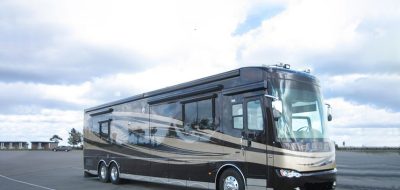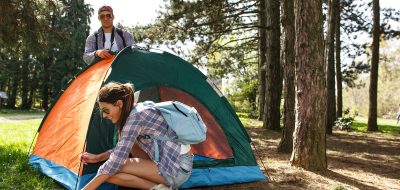Today I am going to dip my toe in to test some turbulent waters. This blog is not meant to discuss whether we as Americans should drill for oil or not, and it’s not meant to discuss fossil fuels versus renewable energy. Just for the record though, I personally feel we should drill for oil in the shorter term and I feel we should continue to seek cost effective alternative fuels for the long term. If however you would like to discuss and/or comment on the topic of the US drilling for oil see Bob Difley’s blog titled, Will Drilling ANWR Ease the Oil Crisis?
My blog today is about what we as RVers can do to be more environmentally friendly as we traverse the country in our RV’s. In addition to producing educational videos on how to use and maintain RV’s I write for different RV trade and RV consumer publications. One column I write is titled RV Smart. It’s for a new consumer magazine titled “RV Magazine.” My most recent assignment is for an article discussing different ways that RVers can be environmentally friendly. This can cover a broad range of topics like: lessening the carbon footprint we leave behind by using renewable energy sources, to just being good stewards to the land we enjoy using so much.
If you think about it RV’s are already environmentally friendly just by design. For example:
1) We are not heating or for that matter using as much water as we do in our homes.
2) It is more efficient to heat and cool the RV simply because of the amount of space we are heating and/or cooling, as compared to our homes.
3) Lots of devices in our RVs use 12-volt DC power, that at home, would require 120-volt AC for the same devices to operate.
The biggest culprit as it relates to energy consumption and environmental concerns are of course the fossil fuels burned getting from point A to point B in our RV’s. But, there are ways we can improve in this area too. And RV manufacturers and automobile manufacturers are designing green RVs, smaller and lighter RV’s and engines that run on alternative fuels.
We as a country, and moreso as RVers can and should protect the environment and leave it in as good of, if not better, condition than we found it. One of my wishes is for my children’s children, and their future generations to visit some of the same spectacular places we have visited in our RV ; and when they do, to see it the same way it was when we first saw it.
I thought what better way to get some input for this upcoming article than to present it to you, the readers and fellow RVers of the RV Net Blog, for comments on how we can be more environmental friendly RVers. Post any suggestions, ideas or comments you have on effective ways we as RVers can give back to our environment; from using renewable energy sources like solar panels, to just plain slowing down and conserving some fuel.
I look forward to your comments, ideas and suggestions.
Happy Camping,
Mark Polk






Pingback: הובלות
Thomas Becher
Where did the 12 volts come from? a genie? It took a converter to repower the batteries or do you have a solar cell or wind generator. The way most campers are built I think I could heat my whole house for a week on what my fifth wheel uses in a day.The walls are bonded white foam(not the good dense high R stuff . The windows are single pane and when I removed the vent in the bedroom to put in a powered one I didn’t see any insulation near the opening.The front bubble? which I had to remove the fix a leak had minimal insulation and large gaps.When the manufactures start putting some Quality into their products will I Agree that we are then Green.
Mark Polk
Thanks for all the great comments and keep them coming. JJ, what I meant about the 12V vs 120V was that rather than using AC to power overhead lights, fans and other items in our RV we can use batteries instead. At home we would be using AC power for these same items.
jjtotten
Great article. One thing that I saw that attracted my attention was the 12 v vs. 120 v. mention. It does not matter what the voltage is it is the watts that is of concern. Whether or not it is 1000 watts at 12 volts or 120 volts it is still 1000 watts.
Dennis & RoseMary
We usually travel with a bunch of grandkids (anywhere from 2 to 9). It’s pretty hard to minimize our “footprint” with such a large group, but we do what we can If we can get decent-tasting water, we drink from the fresh-water tank. Most of the time, groceries go directly from the cart to the cupboard/storage without bags. Bikes with panniers are used for short trips – even to the grocery store, if needed. DW and I can each haul as much as 80 lbs. of groceries in our panniers.
Unfortunately, bottled water and sodas are our usual fare because of the taste of the water in most areas. We mark water bottles with kids names so the bottles can be re-filled when we do get good water. We always save our cans and bottles for re-cycling. Most campgrounds help out by providing recycle containers, usually near the trash dumpster. We were very surprised recently when we found that a certain campground in a large city in Idaho had no place for recycling.
Of course we always stress to the kids the importance of staying on paths and trails, packing out their own garbage and leaving the environment just the way we would have liked to find it..
Lynn Burkhardt
I have gotten used to the canvas bags and am not accepting plastic bags anymore. I just carry the canvas bags in my back seat. Meirs stores in Michigan even have wine bags for 4 count or 6 count of standard wine bottles. It just takes a little getting used to, remembering to take them into the store. The best thing is that you can put a lot of groceries into these bags which requires fewer trips to the car to bring the groceries into the RV. I also have started using coarse kosher salt as my abrasive for cleaning soap scum and mineral deposits off my sinks and showers. I scrub with a sponge/ with the green abrasive side and the coarse salt. It works great, and is much easier on my holding tanks as well as the earth.
Pete
I lived “off the grid” for ten years. My lights were RV flouros, and my sound system was out of a car. An aging Kohler auto-start generator and a couple of golf cart batteries kept them going. It didn’t use much gasolene. The stove and fridge were propane. What I realized then—twenty years ago—was that 12-volt electricity was the way to go.
Bob Difley
Good words, Mark. There are so many ways we RVers can reduce our energy usage compared to our stick houses, and we RVers get pretty creative in doing so. Boondocking is one way, and is increasing in popularity. Boondocking just one or two days a week can cut energy usage by 20%. I would bet also that when boondocking, we hike or walk more, reducing tow vehicle use and therefore fuel usage, as well as getting welcome exercise. Bob